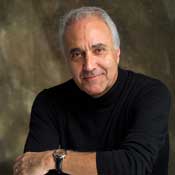Bebu Silvetti
| Bebu Silvetti | |
|---|---|
 | |
| Background information | |
| Birth name | Juan Fernando Silvetti Adorno |
| Born |
March 27, 1944 Quilmes, Argentina |
| Died |
July 5, 2003 (aged 59) Coral Gables, Florida |
| Occupation(s) | Singer-Songwriter, Music producer |
Juan Fernando Silvetti Adorno (27 March 1944 – 5 July 2003), professionally known as Bebu Silvetti or simply Silvetti, was an Argentine pianist, composer, conductor, arranger, and record producer. Popularly known for the 1977 instrumental disco hit, "Lluvia De Primavera" ("Spring Rain" in English), Silvetti was also a successful, Grammy-winning producer for a wide variety of Latin and international music performers. He was the father of the actress Anna Silvetti.
Biography
Early life
Silvetti was born in the city of Quilmes, Argentina, located in the province of Buenos Aires, approximately 17 kilometers from the capital city of Buenos Aires.
He started his piano education at the age of six. During his teenage years he formed his own jazz quartet and a few other musical groups. At 21, Silvetti left Argentina to go to Spain where he stayed a few years working as a pianist at some of the most popular jazz clubs of the time.
Career
In the early 1970s he moved to Mexico and started arranging and composing. Upon his return to Spain some years later, he recorded his first album, which contained his hit offering, "Spring Rain." Other albums followed. Silvetti returned to Mexico in the late 1970s, where he continued arranging, composing and producing mostly for other artists. After a stint working in Los Angeles, California, he eventually settled in Miami, Florida, where he produced, arranged, and composed for a wide variety of Latin and international artists.[1]
During his career, Silvetti worked with performers such as Plácido Domingo, Luis Miguel, Paul Anka, Engelbert Humperdinck, Vikki Carr, Ana Cristina, Roberto Carlos (singer), Rocío Dúrcal, Rocío Jurado, Jerry Rivera, Tamara, Los Kjarkas, Paul Anka, Daniela Romo, Armando Manzanero, José Luis Perales, Daniel Barenboim, Juan Gabriel, Maggie Carles, Los Nocheros, Marco Antonio Solís, Ricardo Montaner, Paloma San Basilio, Raúl di Blasio, Nazareno Andorno, Vic Damone and Selena.
Silvetti achieved many successes and accolades throughout his long and prolific career. In 2003, Silvetti was the recipient of the Latin Grammy Award for Producer of the Year for his work on "Hasta Que Vuelvas" by Luis Miguel, "Quién Da un Peso Por Mis Sueños" by Armando Manzanero featuring Alex Lora and the albums Rocío Dúrcal ... En Concierto Inolvidable by Rocío Dúrcal and Suma by Ricardo Montaner. In 2002, he received the Billboard Producer of the Year Award.[2] In 2001, he topped Billboard's year-end "Hot Latin Tracks Producer Chart."[3]
Death
Bebu Silvetti died at his home in Coral Gables, Florida, at the age of 59 from respiratory failure caused by complications from lung cancer treatment.[4] At the time of his death, he reportedly had composed more than 600 songs, over 200 TV and radio commercials, and a number of film and TV soundtracks.[5]
Musical legacy
His hit track "Spring Rain" was remixed by DJ YOSHITAKA for the Japanese music game beatmania IIDX 13 DistorteD. The song name was changed to "Spring Rain (Lluvia De Primavera)" to signify the remix.
Denki Groove's song "Shangri-La", a remix of which was the ending theme of the 2009 anime series Kūchū Buranko, is based around looped samples of "Spring Rain". Silvetti is credited as a co-writer of the song.
Select discography
- World Without Words (as Silvetti) (1976)
- The Sensuous Sound of Silvetti: Spring Rain (as Silvetti) (1977)
- Concert From The Stars (as Silvetti) (1978)
- I Love You (as Silvetti) (1980)
- Lluvia De Primavera (as Bebu Silvetti) (1994)
- Íntimos (Armando Manzanero and Bebu Silvetti) (1997)
- Boleros Eternos (Carlos Greco and Bebu Silvetti) (2006)
References
- ↑ Rother, Larry. Miami, the Hollywood of Latin America. The New York Times, 18 August 1996. Accessed 7 February 2010.
- ↑ "Bebu Silvetti: music producer." Latino Leaders, April–May 2003: 28. Retrieved 8 February 2010 from General OneFile. (Document ID: A113053452)
- ↑ Cobo, Leila. "Source of 'Silvetti Sound' Still Excels: Veteran, Tops Billboard's Year-End Hot Latin Tracks Producer Chart (Artists & Music)." Billboard, 29 December 2001: 15. Retrieved 8 February 2010 from General OneFile. (Document ID: A81470576)
- ↑ Perez, Erwin. "La música pierde un talento mágico." El Nuevo Herald, 9 July 2003, 2A. Retrieved 8 February 2010 from Ethnic NewsWatch (ENW). (Document ID: 492542641)
- ↑ Latino Leaders.